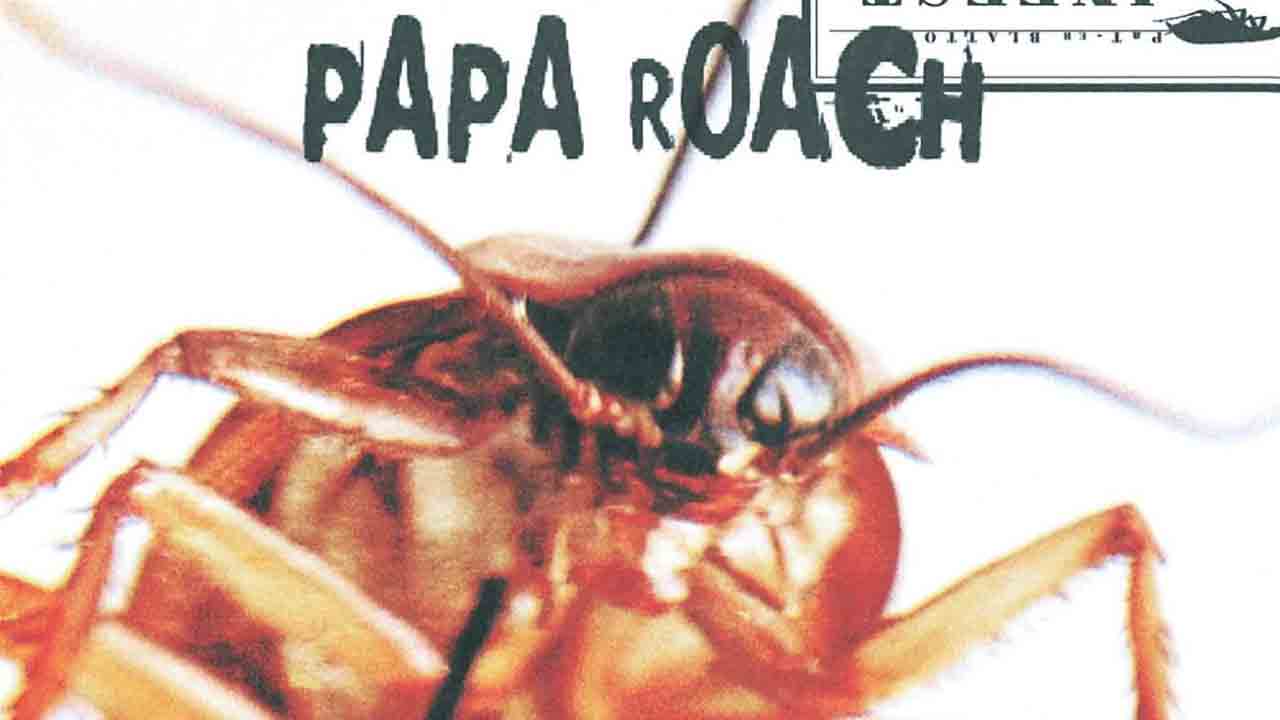It’s been 20 years since Papa Roach dropped their debut album Infest, which propelled them from hometown heroes to worldwide sensations, and helped bring nu metal into the new millennium. As the band prepare to celebrate the album’s 20th anniversary with a special live stream, we asked frontman Jacoby Shaddix to give us a rundown of the songs on their debut album.

Infest
“That one was like the manifesto for the band. That was our statement, our introduction to the world. And that was the M.O. – our music will infest the world. We believed it from the beginning, and I think it was really important for us to have that as the opening track. ‘Welcome to the original Papa Roach sound fire. We just bathed you right there. We just let you know, like welcome to the gang, my name’s /Coby Dick/, I’m telling you what’s up.’ And we took you on the journey after that.”
Last Resort
Jacoby Shaddix: “A lot of people back in the day thought Last Resort was about me, because I wrote it in the first person, but it was actually at the time about one of my best friends. I lived with him, and he attempted suicide as I was living with him, and that was really traumatic for me to be around, because I’m a 17-year-old kid, and one of my best buds tried to kill himself. That was just fucking heavy. Heavy on me, and all of our friend circle. And so I just felt like at the time of writing, digging in and talking about my emotions, that was one of the things I needed to write about.”
Broken Home
Jacoby: “I remember working on this one – we would record our demos on a little boom box, with shitty audio. But I had this little cassette player, and I’d listen to it while I was working. I was just really into digging into my emotions and feelings at this point in time. Because beforehand, it was just kind of singing about nonsense, and this song was just about my childhood and this brokenness that I had inside myself, this hole in my heart growing up in a broken home and not having my father in my life, and that was a real struggle for me as a kid, and as a young adult. I had to put it in the music to kind of like be at peace with it, you know, ‘I know this is what I’ve been through, but I understand’. There’s a lyric in the song that says, it’s something to the effect of like, ‘I understand the way you are, because your father did the same to you.’ Like, it’s just a repeating cycle. And so I think that when I had that realisation, it was really important for me. And I think putting it in the music was healing.”
Dead Cell
Jacoby: “Unfortunately school shootings are a fucking thing, and have been a thing for years. And the Columbine thing really had an effect on me, because it was the first real mass shooting that I can remember. Just somebody going up into a school, I try to put myself in that person’s shoes. Like, what kind of individual could do this. It just felt like this person was void of a soul. I mean, I didn’t know these people, but it just felt like such a massive darkness, that I was just so anti, /that/. I’m like, ‘Fuck that, man. This is not the answer.’ And they were trying to pin this thing on Marilyn Manson, because they wore a Marilyn Manson T-shirt or whatever, and it’s like, ‘It’s not fucking Marilyn Manson’s fault’. It’s just /dark/, man! It’s dark shit! I had to combat it with music.”
- The 10 best Papa Roach videos
- The Story Behind The Song: Papa Roach’s …To Be Loved
- Revenge of the freaks: how nu metal took over the world
- The 10 best songs by the 10 worst nu metal bands
Between Angels And Insects
Jacoby: “There was a movie called Fight Club that really inspired me, and there’s a line that I lifted from the movie that said, ‘The things you own own you’. And I remember being on this spiritual journey and learning about Buddhism, Eastern philosophy, the Tao, and really being on this spiritual journey of trying to find God or whatnot. And along the way, I picked up all these different things and ideas. And the thing about money and possessions, since I’ve been a kid, it’s never been the cornerstone to my existence, to make the almighty dollar and let that control my creativity, let it control my decision making. I’ve gotta pay my bills, I know that. But there’s a difference between providing for yourself and like then raw greed. You see the effects of greed and what it does. It’s like, beyond money, what else is there? It’s power. So if you’ve already got more money than you can fucking handle, it’s like the human ego, unfortunately when it goes unchecked, just runs riot. And you see it at the top – the way people act at the top, the power struggle is fucking real. And it’s so crooked and dark, and reveals a lot of the darkest parts of humanity. And so this song is about that. Not being ruled by the dollar.”
Blood Brothers
Jacoby: “Oh man. That’s just about the crew, man! That’s about the brotherhood. This thing that we built over the years, as an independent band, these dudes were my family. They became my family straight up, and we still are, to this day. We’re still like family. And we fight like brothers. There’s moments where I want to choke a brother out! That’s my blood brother, though.”
Revenge
Jacoby: “I think that lyrically that song was born from abuse. Abuse that I had witnessed at a young age, and just the twisted psychological game of abuse, and how people use power to control people that they ‘love’. And I kind of framed it within this kooky rap-rock track. There was some abuse that I had suffered through as a kid, from a babysitter of mine. And it was not okay, and not good. But, I’m a firm believer that I am not responsible necessarily about the things that happened to me as a kid, but I /am/ responsible for dealing with this shit on an emotional fucking life level, I gotta handle it. I had to come to a place of peace with those things. A lot of times, people just want to bury that stuff, but it manifests in all these other dark ways.”
Snakes
Jacoby: “Snakes was about this motherfucker that took me for my money. I was living with him, and I would give him the rent money, and instead of him paying the rent, he would just go and spend it on weed and whatever he wanted, and got us evicted from our apartment. I’m like, ‘That motherfucking snake, dude’. And so I had been fucked over by a friend. That was not cool. It bummed me out. Snakes, got to watch for ’em, man. See, money! Motherfuckers get weird about money!”
- Best headphones for music: supercharge your music listening
- The best phones for music
- Best music streaming services: how do Spotify, TIDAL, Apple Music and others compare?
- Own your idols with the best Funko Pop! Rocks vinyl figures
Never Enough
Jacoby: “I’m talking about the bottomless pit of self, in a sense. And feeling like when everything’s good in life, it’s not enough. It’s never enough. But then also, on the other side of the coin, saying like, do I deserve to have these things? It’s a song about self worth, and negative self perception, and selfishness, all at the same time. And I think that song in particular was the beginnings of the /rock/ version of Papa Roach, where it wasn’t necessarily... I mean, we were known for rap-rock, but then there were songs like Never Enough, or Binge, or Broken Home, that were very melodic. That I wasn’t rapping in. And so, it was like this other side of our band.”
Binge
Jacoby: “It ain’t no secret that I’ve had a drinking problem. Ever since I picked up the bottle, when I was 16. It was an issue. And it continued to be an issue for years, and... even before I thought I was a full-blown alcoholic, there was this inkling inside myself. I think it was from just the people around me, going, ‘Hey man, you okay?’ And I was like, ‘Yeah I’m fucking fine, what the fuck do you mean. You know?’ My girlfriend at the time, Kelly, she was to become my wife, same thing. She would be like, ‘Red flag, eh you good? You okay? You seem like you’re drinking at lot!’ So it just became an issue. And having an alcoholic for a father, and then me kind of following in those footsteps, it was like, ‘Fuck dude. I said I’d never be like him. Here I am’. I didn’t want to deal with life on life’s terms. Since I was a young kid. I didn’t want to deal with life the way it was, and so music was a great escape for me. Unfortunately I found booze as my true escape.”
Thrown Away
“Thrown Away was a song about the slings and arrows of ADHD and mental health. My younger brother, Bryson, he’s 12 years younger than me. I moved out of the house, and my parents had a real tough time with him. He's ADHD, bipolar, and he’d go into these rage seizures. My parents were almost like, ‘Do we need to commit? Do we need to put him in hospital?’ It was really, really hard for my parents, but they worked through it, and they loved him through all of it. But it was a song from the perspective of a kid that could be potentially given up on. And thank god they didn’t, man. Because a lot people dealing with kids that have ADHD or are bipolar, it became too hard for the parents and they just commit their children. And fuck, man, what a terrible thing. Thank god they didn’t, because he’s just a fucking beam of light. Now as an adult and as a teenager, it’s cool to see him thrive. Honestly, that dude’s a fucking miracle!”
Tightrope
Jacoby: “It was a double-time, up-tempo kind of rock-punk track. The producer [Jay Baumgardner] was like, ‘Well man, this song’s cool, but it just doesn’t seem to fit what you guys are doing. What if you guys just take a whole new approach to this song?’ And so he had us break it down and play it on acoustic guitar. And I was like, ‘Ugh. Fucking acoustic guitar? Like what the fuck do you think we are?’ I’m like, ‘That shit’s fucking lame. That shit’s for the birds. I wanna fucking rage.’ And I was a real big fan of Sublime, and Tobin [Esperance] the bass player started playing it kind of dubbed out, reggae style. I remember that moment specifically, the singer Jay Gordon from Orgy was hanging out at the rehearsal spot when we were doing this, and Jay Baumgardner, the producer, and they were both just like, ‘That’s it! Do that! That’s interesting’. And so that ended up being the secret song on the record.”

